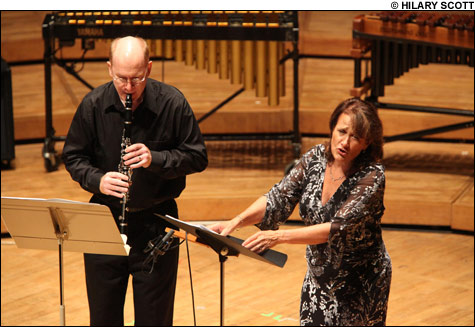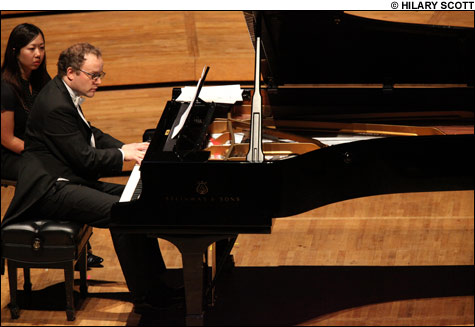
ZAZOFSKY SONGS Thomas Martin and Lucy Shelton brought subtle polyphony to the Elliott Carter premiere. |
After a relatively quiet summer, I saw Boston Midsummer Opera's Cosí fan tutte at BU's Tsai Center. Then I raced out to Tanglewood for a Mark Morris program accompanied by Yo-Yo Ma and Emanuel Ax, a BSO matinee with Ma, and all six concerts in the annual Festival of Contemporary Music. After that, it was on to Bard College, for what was probably the first fully staged East Coast production in nearly a century of Giacomo Meyerbeer's once-ubiquitous grand opera Les Huguenots. All within one week.
I try never to miss a chance to see Cosí fan tutte, but company director Drew Minter's revival of his own amusingly updated staging from 2000 disappointed me. For the first act, Mozart composed one of the most sublime passages in opera, a quintet and trio that bring uncanny musical and emotional depth to a farce about a two friends who, on a bet to prove the fidelity of their fiancées, pretend to get drafted, then return in disguise and switch partners. The quintet of multiple farewells is both an expression of their deepest feeling and also a parody of all lovers' protestations, and their cynical friend can't bear to hide his laughter. This sets up an ironic but heartfelt prayer for the boys' safety. The entire sequence would be reason enough to do — or see — Cosí.

But Minter cut the quintet. Imagine a symphony conductor deciding to omit a slow movement. Cosí has a tradition of acceptable cuts, among them a tenor aria with 13 high B flats. But leaving out the quintet not only wrecks Mozart's musical continuity, it also reduces a multi-layered psychological comedy to sit-com. Even with the musically sensitive Susan Davenny Wyner in the pit, and a game if not consistently sparkling cast, this shallow and coarse Cosí didn't earn serious consideration. Minter's erection joke got a laugh, but the audience got the short end of the stick.
The week's single most exciting performance was Morris's new Empire Garden, which is set to Charles Ives's rambunctious Piano Trio. Ma was at his most mercurial, turning (on a dime) rhapsodic intensity into boisterous playfulness, and carrying pianist Ax and violinist Colin Jacobsen along with him. The dance is a phantasmagoria of marches (both menacing and comic), Sunday devotions, memorial services, and make-out sessions. For Morris's new Visitation, Ma and Ax played Beethoven's late Cello Sonata No. 4, an unusual two-movement work. But despite some striking elegiac dance details, this seemed one of the rare times that Morris's visualization diminished rather than illuminated the score. The evening began with the heavenly A Lake, for which Haydn's Horn Concerto No. 2 was played with exuberance and variegated color by Tanglewood Fellow Lauren Moore, under Gergely Madaras. And Piano Fellow Ingrid Keller delivered a tensile Stravinsky Serenade in A for Morris's exquisite ritual elegy for Susan Sontag, Candleflowerdance.
A few days later, Ma was back with the BSO under assistant conductor Julian Kuerti in a ferocious performance of Shostakovich's Cello Concerto No. 1, and, after intermission, a suave if anticlimactic Fauré Élégie. Programmed in memory of the composer, the late George Perle's brainy-but-scintillating 1990 Sinfonietta II opened the concert with chamber-music delicacy. Ending the afternoon was a buoyantly exuberant Bizet Symphony in C, with John Ferrillo's seductive melismatic undulations in music's sexiest oboe solo.

NOT WITH A BANG British new-music specialist Nicolas Hodges’s piano recital made for a knotty festival closer. |
The Festival of Contemporary Music was planned by Chicago-based composer Augusta Read Thomas. Last year's edition was devoted to a celebration of Elliott Carter's 100th year. This year, there was another Carter premiere: Zukovsky Songs, nine poignant and comic, gnomic ("Rune//ruinin'/runs//Mexico") and expansive poems by Louis Zukovsky performed in subtle polyphony by Carter favorites mezzo-soprano Lucy Shelton and BSO clarinettist Thomas Martin. There were also impressive pieces by a diverse cross-section of esteemed and established composers. In Yehudi Wyner's kaleidoscopic Oboe Quartet, the continual changes of mood and melodic inspiration kept me on the edge of my seat for 25 minutes. Oliver Knussen offered a heartbreaking yet witty memorial for his late wife, Requiem — Songs for Sue, with magical settings of Dickinson, Machado, Auden, and Rilke. There was fine work by Pierre Boulez, Mario Davidowski, George Benjamin; from John Corigliano there was Snapshot: Circa 1909, a sentimental Fritz Kreisler parody in tribute to the composer's violinist father.
But there were at least as many pieces by composers in their 30s or younger, the freshest being 28-year-old Scottish-born Helen Grime's Clarinet Concerto, one of the few works substantial enough to earn its welcome without overstaying it. I'd put clarinettist Brent Besner on my list of young musicians who stood out even among their outstanding colleagues: violinist Stephanie Nussbaum (the soloist in John Zorn's unsettling Violin Concerto, whose extended passages for wind machine almost drowned out the violin); Kathryn Bates Williams, cellist in the Wyner quartet; Gregory DeTurk, the amazing soloist in David Rakowski's two best piano études; and spectacular sopranos Danya Kotek, Elizabeth Baldwin, Rosa Betancourt, and Elizabeth Reiter.